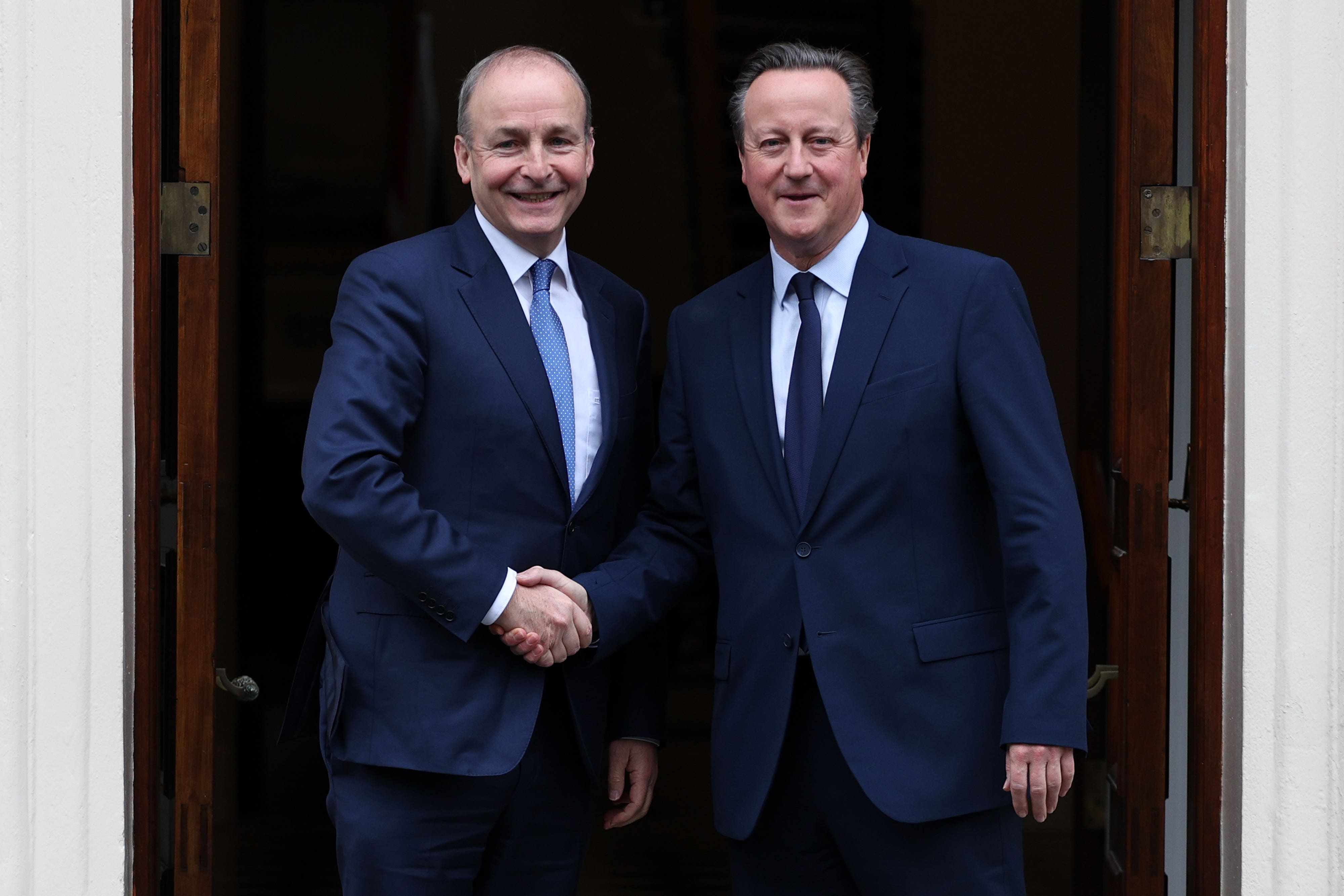Martin praises Cameron after discussion on Stormont and Gaza crisis
Micheal Martin met Lord Cameron in London on Wednesday.

Your support helps us to tell the story
From reproductive rights to climate change to Big Tech, The Independent is on the ground when the story is developing. Whether it's investigating the financials of Elon Musk's pro-Trump PAC or producing our latest documentary, 'The A Word', which shines a light on the American women fighting for reproductive rights, we know how important it is to parse out the facts from the messaging.
At such a critical moment in US history, we need reporters on the ground. Your donation allows us to keep sending journalists to speak to both sides of the story.
The Independent is trusted by Americans across the entire political spectrum. And unlike many other quality news outlets, we choose not to lock Americans out of our reporting and analysis with paywalls. We believe quality journalism should be available to everyone, paid for by those who can afford it.
Your support makes all the difference.Ireland’s deputy premier and foreign affairs minister Micheal Martin heaped praise on David Cameron after the pair met for the first time, but acknowledged divisions on the crisis in Gaza.
The pair met in London on Wednesday, amid the backdrop of efforts to restore powersharing in Northern Ireland and growing international concern over the killing of civilians as Israel continues its offensive against Hamas.
Mr Martin, like Lord Cameron a former prime minister, resisted any suggestion that he had used the meeting to pressure the UK Government to shift its position to back a ceasefire.
Ireland has been among the most vocal European countries in criticising the Israeli bombardment of Gaza and calling for an end to hostilities.
“We used the occasion to give our perspectives, which are different. And also to explore and discuss the issue,” Mr Martin told reporters after he left the lunchtime meeting.
The Irish deputy premier said that Lord Cameron “articulated the UK Government’s perspective on this and their view in terms of how they feel this can be resolved.
“David Cameron has been to the Middle East, he is going again to talk with Egypt and other states. So I think we each have respective positions on this.”
Alongside discussing efforts to stop settler violence against Palestinians in the West Bank, the pair also discussed “what would a political pathway look like” out of the conflict.
The Irish foreign affairs minister did not put a timeframe on when he hoped powersharing could be restored, but indicated that it was up to the Democratic Unionist Party (DUP) to “make a decision” on the £2.5 billion package offered by the UK Government as part of its bid to restore Stormont.
“We await the outcome of the discussions this week in respect of the financial arrangements for Northern Ireland… which are taking place separate to the more specific ones on the Windsor Framework.
Ireland has very strong views in terms of the ECHR and in terms of the degree to which human rights were embedded into the architecture of the Good Friday Agreement
“So, the DUP will have to make a decision on that obviously, but from what I have seen I think progress has been made, and I think the people of Northern Ireland need a government,” he said.
His arrival in London came after a week of high drama in Westminster that saw Rishi Sunak bidding to win over would-be rebels and restive Tory MPs to back his Rwanda plan in its first Commons vote.
Some MPs pushed the Prime Minister to take a more hardline stance on the European Convention on Human Rights, but those calls have prompted concern that any such move could jeopardise obligations under the Good Friday Agreement.
Asked by reporters about such calls, Mr Martin said that he and Lord Cameron did discuss the broader issue of migration.
“Ireland has very strong views in terms of the ECHR and in terms of the degree to which human rights were embedded into the architecture of the Good Friday Agreement. And we remain committed to that.
Stressing the need to “work collectively” to tackle the origin of migration, he said: “It has been a very significant political issue in Britain for quite a long time.
“It is arguable that migration gave rise to Brexit for example. And I think it is going to be a significant feature across Europe into the future. But we have got to respond, understanding the origins of this and do the best we can to manage the situation in a humane and pragmatic way.”
The visit came 30 years after former Irish taoiseach Albert Reynolds and former prime minister John Major agreed the Downing Street Declaration, a key step in the peace process.
The Tanaiste said he welcomed the return of someone with Lord Cameron’s experience, who he said as prime minister “cared about the Irish-British relationship”.
“He cared enough about the relationship, it was in a very strong position by the time he had left. I do feel that he gets it, and very evident from the lunch today we are dealing with a very experienced leader and politician who understands the way the world works and who is still very committed and very engaged so I think that is positive.”
Lord Cameron, in a post on social media, said: “Thirty years ago this week, the UK and Ireland signed the Downing Street Declaration, a historic agreement that set us on the path to peace. Today, we continue to work together to support peace and prosperity in Northern Ireland.”
He said it was “great” to host Mr Martin to discuss “cooperation on key international issues, including our support for Ukraine”.